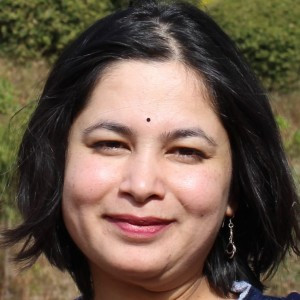I was in the car with my husband, talking about something unimportant, when I noticed the green pollution check sticker on the windshield. And then, without warning, I was at Pashupati, dead on the brahmanaal.
I saw my mother there, crying in that loud, shattered way people cry when they mean it. My mother-in-law held her. My husband stood beside them, stiff and silent. I saw my own body. I had no body, no throat to speak, no hands to reach for them. I don’t know how I was seeing it, because I had no eyes, no form, just awareness, floating.
Then I was moving. Or not moving, exactly, but being pulled upward, faster and lighter, like a breath exhaled after being held too long. The happiness was unbearable. Not the kind that makes you smile, but the kind that sheds your layers, thread by thread, until you are nothing but light. It felt good. Not happy-good, not relief-good, but something deeper, like dropping a weight I didn’t know I was carrying. Darkness swallowed me, and in it, tiny triangles of warmth pulsed like distant lamps. I became one of them. No name, no history, just embers in the black.
Then it ended. I was back in the car, my husband still talking.
The thought that followed: If dying feels like that, no one would stay alive. Maybe that’s why no one knows for sure, because if they did, they’d choose it too soon.
A little bit of backstory. Death was normal in my family. We talked about it openly. "When I die, do this." "When you die, I’ll do that." It wasn’t morbid, just fact. It was practical, almost tender. But socializing with other families taught me otherwise. It taught me death is a hissed word, a thing that clots in the throat. We prop up the dying like broken furniture, spend lifetimes fearing the one truth that never fears us back. And I never understood why.
At present, I know two families with terminally ill members. They’re drowning, in stress, in the sheer exhaustion of keeping someone alive who’s already halfway gone. I want to tell them about the daydream. I want to say, “It’s okay, let go. It’s sweeter than you know, it doesn’t hurt where they’re going.” But that’s not how grief works.
Don’t mistake me, I’m no sage. Ask my husband: I scream at house lizards, panic over delayed texts, twist every minor ache into a catastrophe. I’m terrified of how death comes. The gasp, the choke, the slow-motion fall. But the after? That daydream left me certain that death itself is not the enemy. It’s the door, and beyond it, the ocean. There’s a poem I love, written by Khalil Gibran, about rivers merging into the sea, about how the water doesn’t dread its own end. It helped me. Maybe it’ll help you.
“It is said that before entering the sea
a river trembles with fear.
She looks back at the path she has traveled,
from the peaks of the mountains,
the long winding road crossing forests and villages.
And in front of her,
she sees an ocean so vast,
that to enter there
seems nothing more than to disappear forever.
But there is no other way.
The river can not go back.
Nobody can go back.
To go back is impossible in existence.
The river needs to take the risk
of entering the ocean
because only then will fear disappear,
because that’s where the river will know
it’s not about disappearing into the ocean,
but of becoming the ocean.”
Well, the point? There isn’t one. Maybe dying isn’t the end. Maybe it’s the thing we’ve been waiting for without knowing, like a river finally remembering it belongs to the ocean.
I sometimes feel that we Hindus got it right. Life is suffering. Life is learning. But death? Death might just be the moment the weight lifts.
That daydream felt truer than any scripture, any fear. It felt like coming home.
I don’t know. I can't know. But I like the possibility.






